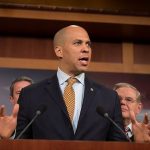Stephen Miller, one of President Trump’s most vocal and influential advisors, has been doubling down on his support for the administration’s efforts to revive American manufacturing. In recent remarks, Miller painted a stark picture of the challenges facing U.S. industry, blaming decades of high corporate taxes, excessive regulation, and globalist trade policies for the decline of domestic production. However, he expressed optimism that Trump’s bold initiatives—centered on tariffs, tax cuts, and deregulation—are laying the groundwork for a manufacturing renaissance.
Miller has been particularly vocal about the role of tariffs in leveling the playing field for American workers. Under Trump’s leadership, the administration has implemented sweeping tariffs on imports from China and other nations, aiming to curb unfair trade practices and incentivize companies to relocate production back to the United States. While critics argue that these measures could lead to higher consumer prices and strained global supply chains, Miller insists that they are necessary to protect American jobs and restore economic sovereignty. He views manufacturing security as integral to national security, emphasizing that a strong industrial base is essential for America’s self-reliance in times of crisis.
In addition to tariffs, Miller champions Trump’s tax policies as a catalyst for economic growth. The administration has prioritized reducing corporate tax rates and cutting red tape to make the U.S. a more attractive destination for businesses. Miller argues that these measures empower companies to invest in domestic operations while allowing families to keep more of their earnings. He frames this approach as a rejection of inefficient government redistribution in favor of unleashing the potential of private enterprise. According to Miller, this strategy not only drives job creation but also strengthens the middle class—a cornerstone of Trump’s America First agenda.
However, Miller acknowledges that significant challenges remain in achieving Trump’s vision of a manufacturing boom. Workforce shortages have emerged as a pressing issue, with nearly half a million open manufacturing jobs reported earlier this year. The administration’s crackdown on illegal immigration has further complicated labor availability, although Miller maintains that securing the border is essential for protecting American workers from unfair competition. He also points to advancements in technology, such as robotics and 3D printing, as key to modernizing U.S. manufacturing and addressing labor gaps.
Ultimately, Miller sees Trump’s policies as part of a broader effort to dismantle what he describes as a bloated federal bureaucracy that stifles innovation and economic growth. By shrinking government and prioritizing essential functions, he believes the administration can foster an environment where American industry thrives once again. For Miller and other supporters of Trump’s agenda, this vision represents not just an economic strategy but a patriotic mission to restore America’s industrial might and ensure prosperity for future generations.




